
Mission Statement:
"To advance through research, education and symposia, an increased public awareness of the Cape Fear region's unique history."

Wilmington's 1898 Racial Conflict
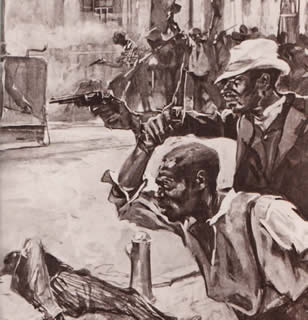
"There are often two sides to a story, but always one set of facts.
The goal of an historian is to transmit those facts honestly
and without bias."
The following transcription is provided to help better understand the
unsettled political climate that helped cause the racial conflict of
November, 1898 in the city of Wilmington. The conflict is also
known as the "Wilmington Race Riot," "Wilmington Race Revolution," and the "Wilmington Rebellion."
This account was published 40 years after the event.
1898 Wilmington Race Riot
Pictorial and Historical New Hanover County and Wilmington
North Carolina - 1723-1938
Edited, Complied and Published by William Lord deRosset,
Wilmington, N.C. 1938
The Wilmington Race Revolution:
The True Story from Official Records
The Wilmington Race Revolution, November 10th, 1898, was the
direct result of ill-advice given Negroes by unprincipled white
Republican leaders. This scurrilous influence, supplemented with recognition given Negroes, through minor political offices such
as magistrates, police duties, etc., had made the darkies impudent,
and insolent. The situation finally developed to the point where
white women and children were being insulted, pushed off the
sidewalks into gutters.
The racial break came at the time mentioned above. As a result,
within 48 hours, it resulted in the white race asserting itself and
regaining absolute control of the municipal and county governments.
The conflict was the direct outcome of the general causes outlined
in the opening paragraph. The principal and motivating final cause,
combine with the general insolence and overbearing attitude of the
Negro race, following bad counsel which they received and followed,
was a diabolical and defamatory editorial. This appeared in a Negro
daily owned and edited by a contemptible Negro named F.L Manly.
This defamatory editorial was as follows, published under date of
August 18, 1898:
“Poor white men are careless in the matter of protecting their
women. Especially on the farms. They are careless of their conduct
toward them. Our experience among poor white people in the
country teaches us that women of that race are not more particular
in the matter of clandestine meetings with colored men than the
white men with colored women. Meetings of this kind go on for
some time until the woman’s infatuation or the man’s boldness,
bring attention to them, and the man is lynched for rape. Every
Negro lynched is called ‘a big burly black brute.’ In fact, many
of those who have been thus dealt with had white men for their
fathers, and were not only not ‘black’ and ‘burly,’ but were
sufficiently attractive for white girls of culture and refinement
to fall in love with them, as is very well known to all.”
As indicated, the above defamatory editorial brought the situation
to a climax. The result was that within 48 hours (when the break
came about a month following publication of the editorial) the white
men of the city rose in their wrath and indignation. They overthrew
the then-existing radical, Republican Government and drove the
majority of the Negroes’ white leaders from the city.
In a review of this nature, brevity, as a matter of course, is essential.
For this reason, only the high spots which led to a restoration in Wilmington, of a white man’s government for white people,
can be set forth.
While the cumulative causes had resulted from a number of years’ misgovernment in the state, the county, and the city, the fact is that
for a year previous to the break, the white men of Wilmington realized
that they had to band together to protect their homes. Colonel Roger Moore, a brave and distinguished officer of the Confederate Army
in command of the Third North Carolina Cavalry, by popular acclaim
had been placed in entire charge by his fellow citizens. They had
confidence in his integrity, his coolness and discretion as a leader.
Capt. Walter G. MacRae and Dr. J.E. Matthews were selected
as Lieutenants.
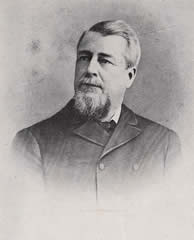
Colonel Roger Moore
Under Colonel Moore’s guidance the entire city was zoned and
sectioned. Each city block was patrolled throughout the night,
for twelve months or more, prior to the break.
One can well image the indignation and burning resentment which
followed publication of the infamous editorial in the Negro daily.
Within the first week of November, 1898, in the state election,
the Republican regime was swept out of power. Democracy again
reigned supreme. The determined campaign waged in New
Hanover County had been largely instrumental in influencing
other sections of the State.
On the morning of November 9th, 1898 a mass meeting of white
citizens was called in the court house of New Hanover County.
Colonel Alfred Moore Waddell who had represented this District
in Congress, was called to the chair. A lengthy set of resolutions
was read and adopted.
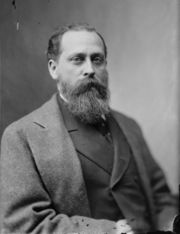
Alfred Moore Waddell
The gist of these resolutions was approval of the fact that a white
man’s government had been restored in the State, and that it was
the determination of the citizens present to have a similar form of Government in Wilmington, to succeed the disreputable “carpet bag” regime which had disgraced the city over a period of years. The
chief feature of the resolution was an ultimatum to the Negro
editor Manly, declaring his banishment from the city within
a period of 24 hours.
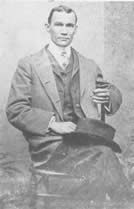
Alexander Manly
A citizen committee of 25 was appointed at the mass meeting to carry
out the spirit of the resolutions. This committee held an organization
meeting during the afternoon. In the meantime they had called a
number of Negro citizens, who were assumed to be leaders of
their race, into conference. To this delegation of Negroes was given
the ultimatum about Manly’s banishment. A reply within twelve hours
was demanded. Failure to receive such a reply, it was declared,
would be followed with definite action by the white citizens.
The reply was demanded by 7:00 A. M., of November 10th, 1898, presumably by hand, from the Negro delegation. It appeared that
an answer was drafted by the Negroes, but supposedly, was
placed in the mails.
The morning of November 10th, 1898 in Wilmington, was
characterized with a tense nervousness, which indicated subsequent startling developments. It was generally known that the reply which
had been expected from the Negro committee had not been received. Shortly after daybreak, Colonel Moore and his divisional leaders
had taken their assigned positions in different parts of the city,
where they remained until developments required their
presence elsewhere.
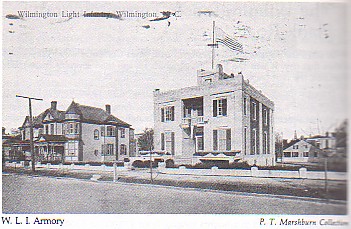
About 10:00 A.M., a crowd gathered at the Wilmington Light Infantry Armory on Market Street. Colonel Waddell was present. In response
to suggestions from members of the crowd he led the assemblage to
the neighborhood where the Negro paper was published. This building caught fire soon after the arrival of the crowd. Many joined in the
statement that the fire resulted accidentally. In any event the building
was practically destroyed, the blaze, at the same time wiping out of existence the Negro sheet which had carried the editorial defaming
and traducing the white women of the South.
When reports of the fire were received in the business district,
considerable excitement prevailed. At the corner of Front and
Walnut Streets, a large crowd of Negro laborers, who were
employed at the nearby cotton compresses, gathered. These
colored people were not intent on making trouble. The fact is,
the belief was expressed that few, if any, were armed. They were,
rather, in a state of bewilderment, wondering what had happened,
and what might eventuate.
Colonel Roger Moore, as stated above, was in command of the
entire situation. While controlling the assembled citizens at Front
and Walnut Streets, Colonel Moore was harassed by two or three excitable, white men. They told him, in effect, if he did not give the
order to fire into the Negroes on the opposite corner, that they
would do so.
Without losing his head, but with calmness and determination,
Colonel Moore responded to these hot heads. He said he had been
placed in command by his fellow citizens. Until they recalled him he intended to remain in command. He said there was no occasion at this
time for bloodshed and he certainly had no intention of having
bewildered Negroes slain in cold blood.
With this announcement, Colonel Moore told the several men who
were commanding him to give the order to fire, that he would allow
them exactly one minute in which to take their place in the ranks.
If they did not comply immediately, then he would have them arrested
and placed in jail until they cooled off. These men clearly perceived
that Colonel Moore meant exactly what he said. They then lost
no time in obeying his command.
The actual outbreak, resulting in loss of life, happened in the northern section of the city, early in the afternoon. A Negro fired into a crowd
of white men, standing near the corner of Fourth and Harnett Streets.
One white man was seriously wounded. Later, another was shot and painfully hurt. During the turbulence and conflict which resulted,
it was estimated that from seven to ten Negroes were killed.
Realizing that the aid of military forces was essential, appeal had
been made to the Governor for declaration of martial law. In the
late afternoon, this step was taken. Several companies of soldiers
from nearby points were ordered into Wilmington. Colonel Walker
Taylor, of the National Guard, was then placed in command.
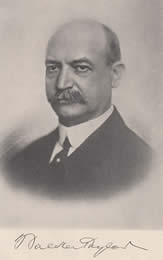
With this step, the organized citizens forces which had been
functioning on a quiet basis for a year or more under the direction
of Colonel Moore, disbanded. There was no further need for their
services. Colonel Taylor was a man of discretion and good judgment,
and the situation within 48 hours was so much quieter, that the
visiting troops were ordered home.
Many Negroes, who were frightened to the point of distraction
with the turn of events, went to the woods near the city. They thought
their lives were in jeopardy. One of the last orders given by Colonel
Moore before his authority was vested in Colonel Taylor, was to
a number of white men. He told them to go in the woods, tell the
Negroes they could safely return to their homes, if they behaved themselves, and that they would be protected.
Within three days the resignations of both colored and white city
officials (representing the scum of the radical Republican rule),
had been forced. Colonel A. M. Waddell was chosen Mayor,
and an entirely new board of aldermen elected.
Under this change of administration, municipal affairs were
straightened out, and all preparations completed for a progressive
and sane policy of ruling the city, under white administration.
Assurances were given the negroes that as long as they recognized
the fact that past conditions would never again be permitted, that
their welfare would be looked after under the new condition of affairs.
A number of despicable white leaders who had largely been
responsible for the unwholesome condition of affairs, were escorted
by an outraged citizenship to trains, placed aboard cars, and ordered
never to return to Wilmington. Thus ended, what in effect might be
termed the “Wilmington Revolution.”
It was in reality merely a determined, successful movement among
white citizens to control and to manage the affairs of their municipal Government. What was true of Wilmington, as a city proved true
of North Carolina as a state. Within a comparatively short time
white supremacy again became a recognized
and acknowledged fact.
This interesting chapter in Wilmington’s development has been
recorded as an historical fact. Since the happening outlined above,
the feeling between the races has been friendly and cooperative.
The Negroes have been given the advantages of good schools,
and the same benefits from health and fire protection, etc., as
have been accorded the whites, despite the fact that probably as
much as 95 per cent of the general tax levies are paid by the
white race. Leaders of the white element are interested in the
progress and advancement of the Negroes of the community
and never turn a deaf ear to any worth suggestion or
appeal of the colored citizens.
No better conclusion to this brief history of the Wilmington Race Revolution can be offered than to relate an incident which illustrated
the humanness and fidelity of the leadership of Colonel Roger Moore.
During the afternoon of the riot, November 10th, several of the
“scalawag” white leaders of the Negroes, were captured. They
were placed in jail overnight, prior to their planned banishment
from the city. Several hundred enraged white citizens gathered in
front of the jail, as darkness approached. Threats of lynching the
prisoners were freely made. It appeared as if trouble was brewing
and that it was imminent.
Colonel Waddell, who had been chosen Mayor, went to the home
of Colonel Moore in the early evening of November 10th. He
advised Colonel Moore that threats of lynching had been heard.
He indicated that it would be ruinous for his administration, if any
such untoward event occurred. Colonel Waddell told Colonel Moore
that the latter was being appealed to, as the only man in Wilmington
who could control the crowd and prevent them from taking possible
action, which later might constitute a blot on the man of the city.
Colonel Waddell entreated Colonel Moore to go to the jail, to
control the crowd and to prevent hasty or violent action.
Colonel Moore had gotten no sleep for a period of forty-eight hours, having been on duty continuously as Commander of the citizens
protective units. Nevertheless, he told the Mayor that if he could help,
his attitude still was to prevent the citizenship from killing men who
were already in custody of the law.
Adhering to his promise, Colonel Moore immediately left his home,
went to the jail, and took his position, standing with his back to the
door. There he remained throughout the entire night. He told the
crowd that the imprisoned men were entitled to protection and
would receive it, since an aroused citizenship had already secured
control of municipal affairs. He said it would be a disgraceful reflection,
not only upon the participants but upon the city itself, if anything
happened to the prisoners, since they, already, were in custody
and would be dealt with properly.
Every persuasive and argumentative effort was put forth to have
Colonel Moore leave the jail. The men in the crowd were aware of
the fact that if he left, they could carry out their plans; that, however,
if he remained, they would have to kill him before an entrance to
the jail could be forced.
Colonel Moore thoroughly understood what the men had in mind,
and also, what would happen if he returned to his home. For these
reasons, he told the crowd frankly and positively that he intended
to hold his post at the jail door, throughout the night. He said the
only way they would enter the jail, would be after they might have
forcibly removed him fro his position.
Colonel Moore held the unbounded confidence and esteem of the citizenship as a whole and as results proved, he demonstrated the fact
that he was the one man, as selected by the Mayor, who could handle
the situation. His sound counsel and positive attitude prevailed and
the assembled crowd dispersed in the early morning hours, leaving
Colonel Moore still at his post at the jail door, and the prisoners
within the jail, terrified but unharmed.
Under the change of administration from the Republican radical
regime, which antedated Nov. 10th, 1898, to a dependable,
conservative, progressive white man’s government, the permanent
form of control until succeeding elections, properly held, was under
the following capable Board of Aldermen, serving with the Mayor:
John H. Hanby, Chas. H. Ganzer, James W. Kramer, Henry P. West, Wm. H. Sprunt, Hugh MacRae, J. A. Taylor, P. L. Bridges,
C. W. Worth, A. B. Skelding, B. F. King, F. A. Montgomery,
and C. L. Spencer.
Josh T. James was chosen City Clerk and Treasurer;
Col. Thos. W. Strange, City Attorney, Jos. H. McRee, City Surveyor,
and E.G. Parmele, Chief of Police.
©2006 Cape Fear Historical Institute